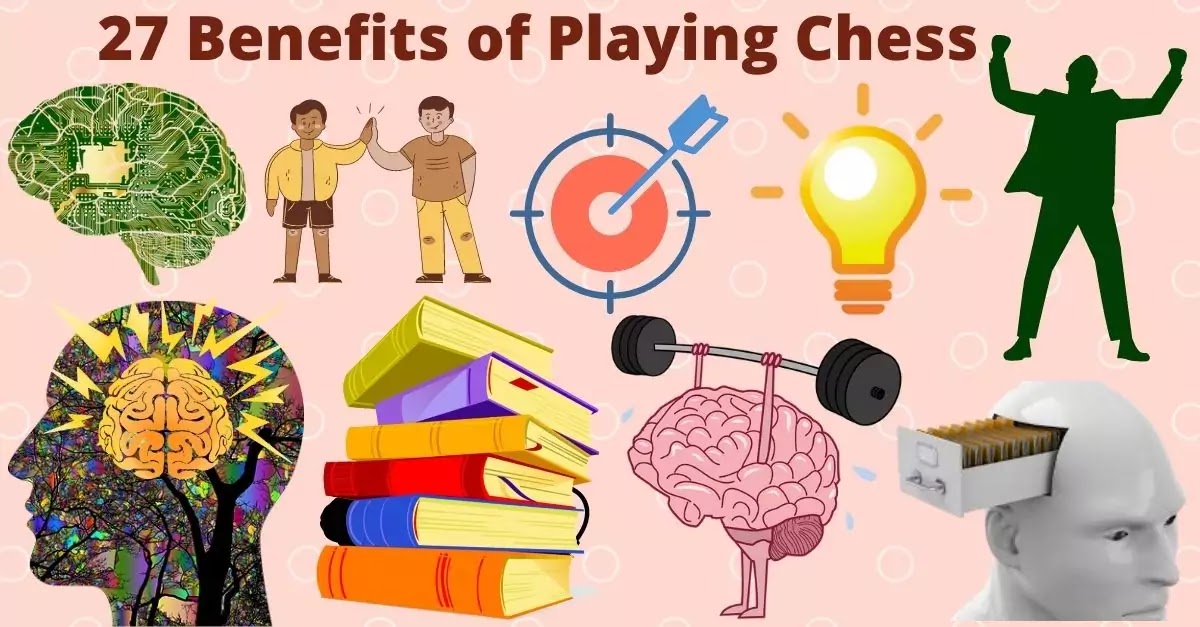The 27 Best Benefits of Playing Chess
Benefits of Playing Chess, let’s start……
Chess has been around for hundreds of years, and there are plenty of arguments as to why it’s such an important game in history and culture today. Because it’s such an interesting game with many different benefits.
I think it’s worth learning more about the many benefits of playing chess. You might already know about some of these benefits, but you may be surprised to learn about others, that aren’t so obvious at first glance.
Whether you want to play chess professionally or just have fun with your friends, understanding these benefits can help you improve your skill level quickly and safely. In this guide, we’ll go over 27 of the benefits of playing chess.
NOTE: Are you curious to know about all the stats of Chess For Children Of All Ages? If yes, then definitely read this article. Chess For Children Of All Ages
1. Chess Is An Educational Tool
Children who learn chess at a young age are more likely to be better at reading and math, develop better problem-solving skills, pay more attention in class, and have higher critical thinking skills.
One study showed that kids who took part in chess programs were twice as likely to succeed in school than their peers. If you’re ready to help your child excel at school, why not start with a game of chess? Every game counts!

Benefits of Playing Chess
2. Become Better At Maths
Learning to play chess helps develop critical-thinking skills, which can help students learn maths and science. Chess helps kids build problem-solving capabilities, allowing them to consider each potential move before it’s made.
In doing so, kids are able to become better at working through complex problems in other subjects as well. A student might use their reasoning skills to figure out how best to solve a tough algebraic equation. A sharp mind is essential when you have to solve a complex math problem very quickly, chess helps us in this.
3. Exercises The Brain
According to a University of London study, chess can help stave off dementia and other types of cognitive decline.
The exact cause-and-effect relationship hasn’t been confirmed, but researchers suspect that people who play chess may be better at thinking several steps ahead, which means they’re able to see patterns and predict possible outcomes much more easily than their peers.
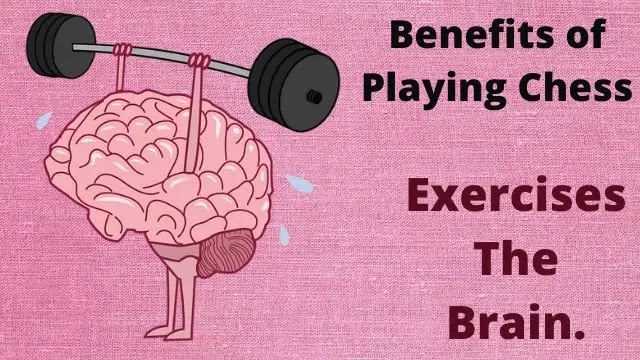
benefits of chess playing
4. Keeps Your Brain Young Longer
One study found that people who played chess at least twice a week experienced less age-related atrophy in certain parts of their brains than non-players.
The regions involved include those responsible for planning, organization, strategizing, and problem-solving—all useful things to help keep your brain young longer.
5. Increases IQ Levels
Numerous studies have shown that chess helps improve cognitive abilities. Specifically, playing chess has been proven to improve planning, problem-solving, and forward-thinking skills, all of which contribute to a higher IQ level.
Children who play chess have been shown to score better in exams, and are more likely to pursue careers in science or engineering fields.
Additionally, many professional players say they learned valuable life lessons while playing competitively from a young age. These include perseverance, team building, and learning how to handle defeat with grace.

Best Benefits of Playing Chess
6. Improve The Growth Of Dendrites Brain
Did you know that playing chess could help promote growth in your brain’s neurons? Studies have found that adults who play chess regularly build dendrites, which are like neural bridges between brain cells.
The more dendrites you build, the better connected your neurons become—which means sharper memory and recall. This is why some people consider chess an effective cognitive enhancer.
7. Improves Your Memory
According to one study, chess players have better memories than non-chess players. They were able to recognize more items after a period of distraction and were able to recall more words from a list.
(via Psychology Today) Puzzles Problems Creativity: In another study, students performed better in puzzles after playing chess for 20 minutes, compared with those who played cards or did nothing. This improvement was sustained even six months later when they returned to play again.
On the basis of many types of research, it has been proved that the creativity of a person is associated with the level of playing chess.

Best Benefits of Playing Chess
8. Improves Focus
Research has shown that chess players experience more gray matter in certain areas of their brains, which improves focus and short-term memory.
When kids (or adults) have a hard time concentrating, playing chess might be a great way to help them get focused on their schoolwork.
9. Builds Confidence
There’s a reason chess is considered a worldwide symbol for intelligence. And it’s not just a stereotype. A lot of research has been done on how playing chess can raise your IQ, improve critical thinking skills, and boost problem-solving abilities.
When you play chess, you’re forced to make logical decisions. The more practice you get at playing chess, and seeing each move through from start to finish, the more confident you can be in other areas of life.
You should find yourself doing things, like making better decisions at work or becoming more decisive with your loved ones.

play chess benefits
10. Develops Pattern Recognition Skills
According to research published in the journal Psychological Science, experienced chess players can make faster and more accurate analyses and predictions than others. Researchers believe that playing chess helps develop pattern recognition skills.
If you want to get ahead in your career, one good way is to learn how to quickly recognize patterns in data and information. Chess can help you with this.
11. Lowers Stress Levels
A study from New York’s Grand Central Station revealed that chess players had a lower stress response than non-players. In other words, as you struggle over your next move, your body releases less of those pesky hormones that cause anxiety, and more of those feel-good hormones (serotonin) responsible for relaxation.
The evidence doesn’t end there, either: A 2014 study published in Proceedings of National Academy Sciences discovered, that those who play chess regularly have fewer heart problems later in life.
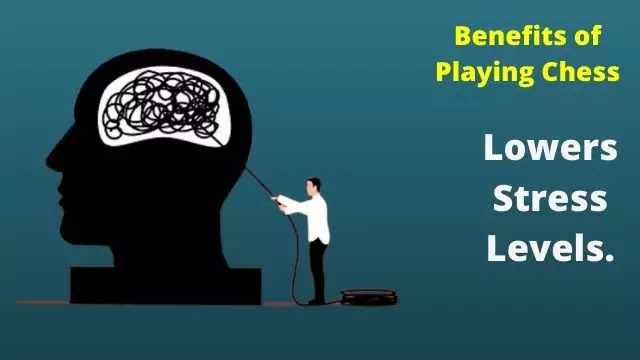
advantages of chess
12. Elevates Creativity
Studies have shown that playing chess can boost creative thinking, as well as improve problem-solving skills and critical-thinking abilities.
Playing chess actually stimulates communication between our right and left hemispheres, encouraging us to look at problems from all angles. Chess is a great tool for developing lateral thinking, explains British grandmaster John Nunn in his book Learn Chess.
13. Develops Problem-Solving Skills
In chess, you’re required to be completely analytical and mindful in order to make your next move. Think about how many problems you encounter in your daily life, that could benefit from a systematic approach.
By learning how to think through chess problems, you can equip yourself with valuable problem-solving skills that will help you succeed in a number of aspects of life.
In fact, studies show that older people, who play chess regularly are far less likely to suffer from dementia or Alzheimer’s disease.

Benefits of Playing Chess
14. Better Decision Making
In just one hour of playing chess, you’ll be able to practice and improve your decision-making abilities. It takes concentration, foresight, and strategic thinking to win at chess, and those skills translate perfectly into everyday life.
By taking on a new challenge each time you play chess, you’ll enhance your ability to problem solve and strategize for success in all areas of your life. These benefits are also available in multi-player mode.
15. Learns To Stay Calm Under Pressure
There’s no better way to exercise your self-control than playing chess. This ancient game has been played for thousands of years, and it remains popular for a reason. If you get nervous or worry about losing while playing, chances are your opponent will use that hesitation to their advantage.
It teaches players to stay calm under pressure, even when their opponent is making all sorts of distracting noises. With nothing but a board and pieces, chess players are forced to think clearly and make calculated decisions while feeling every ounce of pressure from their opponent.
So a person playing chess naturally gets used to the pressure, so it will be a natural reaction for you to remain calm under pressure. It benefits him in every sphere of life.
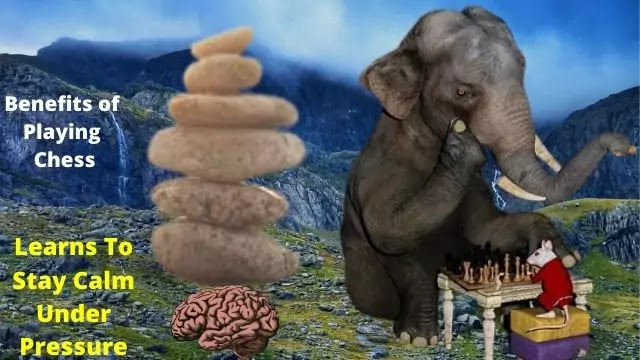
Benefits of Chess Playing
16. Boosts Planning Skills
From an early age, chess teaches us to think ahead and plan for possible outcomes. Rather than simply reacting to your opponent’s moves, you can use a chessboard to anticipate his next steps and prepare countermoves accordingly.
This is an invaluable skill for business leaders, who often need to react quickly in changing situations, but who must also remain mindful of potential long-term consequences.
17. Helps You Empathize With Others
A game played on a board, chess teaches us to see things from other people’s perspectives. You can feel for yourself how many ways there are to analyze an issue or idea.
How would someone else handle a sticky situation? What is my opponent’s next move? How can I persuade them to do what I want? It may sound far-fetched, but as we walk in others’ shoes, so to speak, it becomes easier for us to empathize with them.

Benefits of Playing Chess
18. Develops Perspective
Whether you win or lose, chess teaches you to deal with problems objectively. It’s easy to get frustrated and overly emotional during a chess match, especially if you’re losing. But playing through these difficult times in matches can help you handle setbacks in your everyday life, with a clearer head and a more level-headed attitude.
19. Increases Self-Awareness
The habit of playing chess can increase a person’s self-awareness. The game forces you to make many decisions quickly, and thinking through each move with greater depth helps you realize your strengths and weaknesses.
It also allows you to become more aware of how other people make decisions, which will help you recognize different personality types at work and in your personal life.
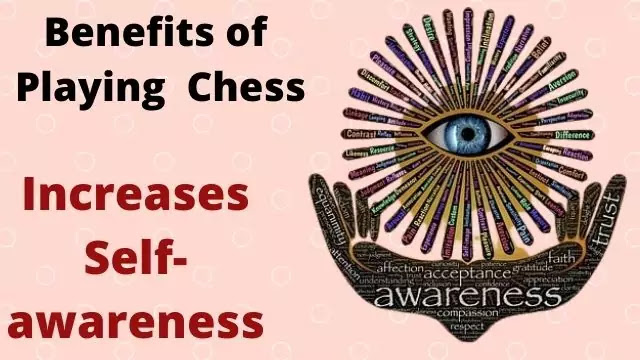
Benefits of Playing Chess
20. Encourages Self-Discipline And Patience
The best chess players are also some of the most disciplined and patient people you will ever meet. To become a good chess player, you must be willing to dedicate yourself to a long-term goal and wait for results.
Instead of being discouraged by slow progress or uncertain outcomes, great chess players see obstacles as opportunities to get better at their craft.
You practice playing chess with concentration, which creates new moves in your mind. Therefore, to make progress in material life, you must apply these principles in your life.
21. Brings People Together
One of my favorite benefits is that chess brings people together. The game has long been a way for friends to bond and for families to interact.
Not only does it help to build social bonds, but research has shown that children with involved parents tend to do better in school, including higher scores on standardized tests.
Don’t underestimate how much your kids need you, especially when they’re young!

Benefits of Playing Chess
22. Teaches Sportsmanship
A lot of things can be learned from playing chess, including sportsmanship. Before every game, you will shake hands with your opponent to indicate mutual respect for one another, even though you are about to engage in battle.
You’ll also address your opponent as Sir and Ma’am, which is something that we could all use more practice at. These activities are really great and awesome.
23. Helps ADHD Disorder
People with attention deficit hyperactivity disorder (ADHD) tend to perform very disappointingly on tasks involving sustained attention and mental flexibility.
However, playing chess could help ADHD sufferers sharpen their memory skills and improve their ability to think flexibly, according to a study published in Psychological Science.
Children with ADHD who played chess improved their thinking skills better than kids, who were taught relaxation techniques or other cognitive-skills training.

health benefits of chess
24. Reduces Panic Attack Symptoms
There’s a growing body of research that suggests chess can help reduce symptoms of anxiety. In one 2014 study from Florida International University, researchers had middle school students play a game of chess or watch others play for 15 minutes. Afterward, researchers quizzed them about their stress levels and anxiety levels.
The results? Not only did those who played chess report less anxiety, but they were also better at keeping their stress in check when faced with stressful situations later on.
25. Helps Prevent Alzheimer’s Disease
A 2009 study published in Brain and Cognition examined chess players, and non-chess players and found that chess players had increased brain activity in parts associated with memory, attention, visual processing, and strategic planning.
Researchers believe that engaging in these areas promotes brain health, and helps prevent Alzheimer’s disease.
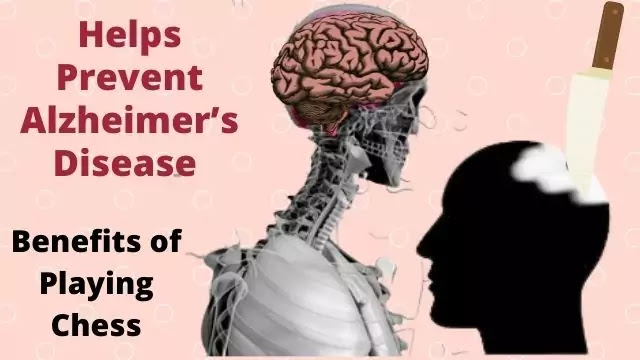
Benefits of Playing Chess
26. Protects Against Dementia
Research shows that playing chess can offer a big-time boost to your mental faculties. In fact, one study published in Brain, Behavior, and Immunity found that seniors who played chess regularly performed better on certain cognitive tests, than their peers who did not play. Researchers say it’s likely because playing chess increases brain activity and improves memory skills.
27 Helps Treat Schizophrenia
While it’s not a long-term solution, studies show that chess therapy can help some patients manage symptoms and improve social skills.
Schizophrenia is marked by cognitive impairment, so chess—which relies on logical thinking and foresight—can help offset these deficits.
One study found that after just three months of intensive chess training, schizophrenic patients showed significant improvements in all areas of cognition.

Benefits of Playing Chess
Conclusion
Like any hobby, playing chess has its own set of benefits that can positively affect your life and your well-being in many ways.
If you’re looking to get more out of life, you may have considered joining a chess club or starting your own game at home with friends or family members.
Not only does chess have a rich history as an entertaining and educational pastime, but it also has some benefits that can improve your life off the board as well!
FAQs
Q 1. What is the 5 benefits of playing chess?
Ans: While there are countless benefits of learning chess, here are some of the most important benefits: Exercises The Brain, Increases IQ Levels, Keeps Your Brain Younger, Improve the Growth of Dendrites Brain, Improves Your Memory, Improves Focus, Better Decision Making, Builds Confidence.
Q 2. Why is chess good for your brain?
Ans: Although many people think chess is merely a game for geeks, it is good for your brain. Playing chess can help to keep your mind sharp, improve your cognitive functions, and reduce stress.
Q 3. Does chess improve IQ?
Ans: Chess not only stimulates logical and spatial thinking, but it also increases language development and problem-solving skills, according to a 2013 study published in Intelligence.
These findings were replicated in 2015 by researchers from Queen Mary University London who found that improvements in IQ are linked to how long you’ve been playing and your level of skill.
The same study also found positive correlations between IQ and several other cognitive abilities such as creativity, working memory, and reading comprehension.
Q 4. Is chess a good hobby?
Ans: First off, playing chess might not just be a hobby to some; it could actually be their job. For example, former World Champion Vishwanathan Anand has made more than $3 million from his career in professional chess.
With that said, if you are looking for a fun leisure activity to do in your spare time and make some new friends along the way, then yes — playing chess can certainly be beneficial for both children and adults alike.
Power Questions
Q 5. Is chess the hardest game?
Ans: That’s a tricky question to answer, as it can be quite subjective. We do know that chess is one of few games in which we compete against ourselves and not against other players.
So if we had to pick a winner for the hardest game ever, chess would have our vote. When you think about all there is to learn—the board, rules, moves, strategies—it’s easy to see why playing chess could take up much more than an afternoon at home.
Q 6. Was Albert Einstein good at chess?
Ans: One thing that people love to wonder about is whether or not Albert Einstein, one of our greatest thinkers, was also a chess player. As it turns out, yes, he was! In fact, he was actually quite good at chess.
Some even argue that he was better than a lot of other notable players in his day. In fact, people who knew him to say that he played games with himself on long train rides while traveling and so on.
Q 7. What happens if u play chess every day?
Ans: Some chess players report that they feel less stressed and experience an overall sense of well-being when playing chess regularly. People who play chess tend to be mindful thinkers, meaning they are more conscious of their thought processes than your average person.
Therefore, those who play chess tend to be more introspective and emotionally aware than others. Due to these effects, playing chess has also been linked with decreased symptoms in people with ADD and OCD.
Super Power Questions
Q 8. what are the physical and health benefits of playing chess?
Ans: Experts say that playing chess enhances intelligence and memory, increases problem-solving skills, and helps to reduce stress levels by increasing blood flow to your brain. A game of chess also helps to improve your hand-eye coordination.
Q 9. what are the mental benefits of playing chess?
Ans: Not only does playing chess improve mental acuity and creativity, but it can also reduce stress and prevent dementia.
According to a 2010 study conducted by The Royal Society in London, players over age 50 that play at least eight hours per week can delay or even prevent Alzheimer’s disease and other forms of dementia by up to five years.
Additionally, researchers have found that playing chess can improve memory recall and strengthen decision-making skills.
Q 10. what are the psychological benefits of playing chess?
Ans: You may think that playing chess is just a hobby for kids, but there are a number of interesting psychological benefits from playing chess.
For example, according to studies conducted by Dr. James Burland at Northwestern University, individuals who play chess experience improved memory and critical thinking skills, as well as increased creativity and even decreased incidence of Alzheimer’s disease.

